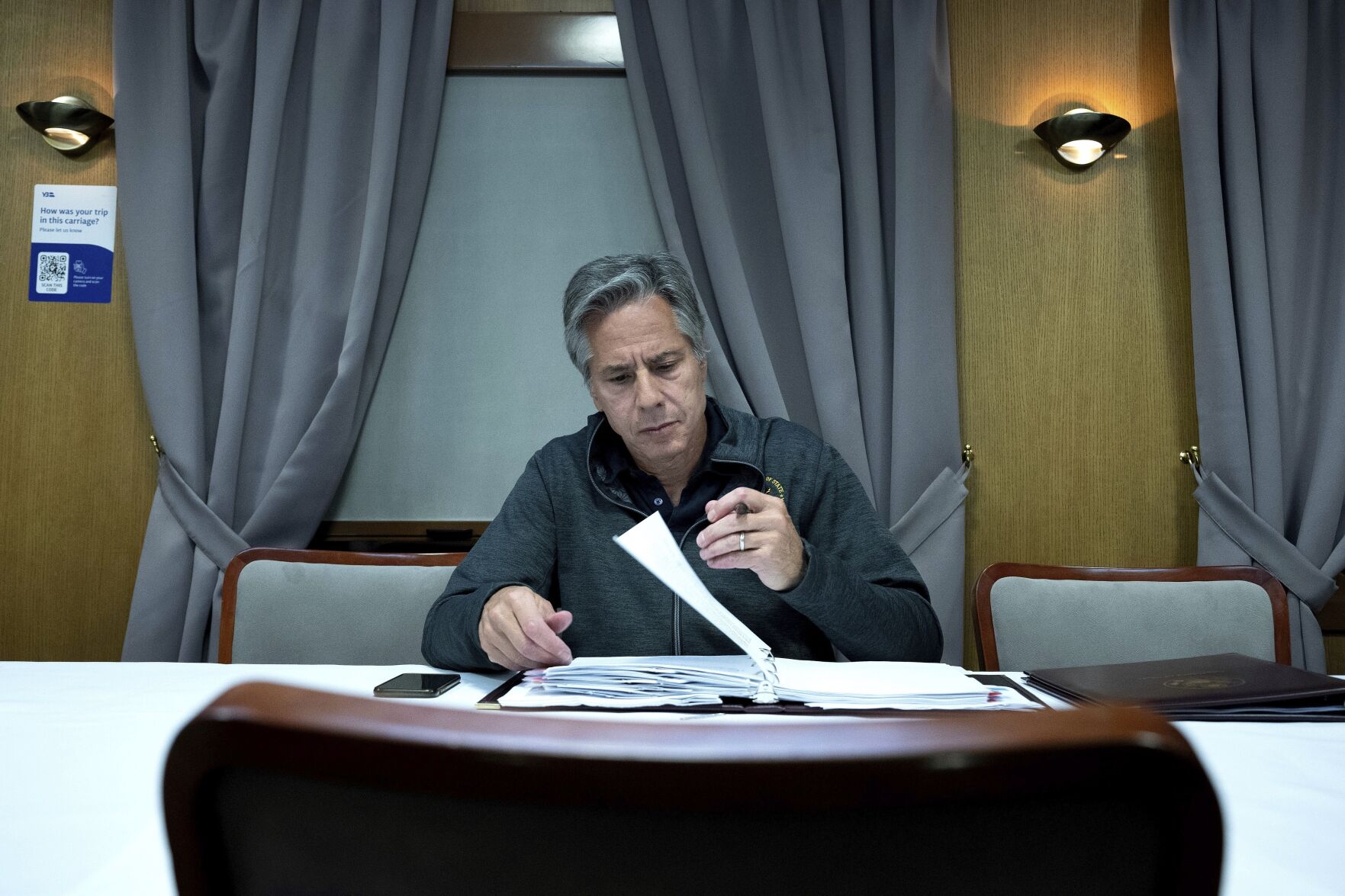KYIV, Ukraine — U.S. Secretary of State Anthony Blinken arrived in Kyiv on an unannounced visit today, hours after Russia launched its first missile attack in a week against the Ukrainian capital.
Blinken’s trip aimed to assess Ukraine’s 3-month-old counteroffensive and signal continued U.S. support for Kyiv’s efforts to drive out the Kremlin’s forces as some Western allies are expressing worries about progress after 19 months of war, according to U.S. officials.
After arriving in Kyiv, Blinken laid a wreath at the city’s Berkovetske cemetery to commemorate members of the Ukrainian armed forces who lost their lives defending the country.
He is expected to meet with President Volodymyr Zelenskyy, Prime Minister Denys Shmyhal, and Foreign Minister Dmytro Kuleba to discuss the ongoing counteroffensive and reconstruction efforts.
On the train journey to Kyiv, Blinken met with Danish Prime Minister Mette Frederiksen, also on an official visit, to discuss the war. Blinken thanked her for Denmark’s leadership in a coalition training Ukrainian pilots on F-16s and for promising to donate the fighter jets to Ukraine, according to State Department spokesperson Matthew Miller.
Washington officials said there will be discussions of alternative export routes for Ukrainian grain following Russia’s exit from the Black Sea Grain Initiative and its frequent bombardment of port facilities in the Odesa region, from which most grain is transported abroad.
Those alternatives may include new overland routes, or ships hugging coastlines to keep out of international waters where they could be targeted by Russia’s navy.
Blinken’s visit is expected to include the announcement of new military aid of between $175 million to $200 million. Another, larger military assistance package is expected later this week.
Other issues, including support for Ukraine’s war-torn economy will be discussed, building on Blinken’s June announcement in London of $1.3 billion in aid to help Kyiv rebuild, with a focus on modernizing its energy network, which was bombarded by Russia last winter.
Overnight, Russia fired cruise missiles at Kyiv in the first aerial attack on the capital since Aug. 30, according to Serhii Popko, the head of Kyiv’s regional military administration.
Debris from a downed missile struck the premises of a business in Kyiv, causing a fire and damage to the company’s equipment. No casualties were reported.
In the Odesa region, meanwhile, one person was killed in a Russian missile and drone attack that hit Izmail port. The attack damaged grain elevators, administrative buildings and agricultural enterprises, local authorities said.
The trip to Blinken’s fourth visit to Ukraine since the war began, including one very brief excursion over the Polish-Ukrainian border in March 2022, just a month after the Russian invasion.
However, it will be the first time America’s top diplomat spends the night in Ukraine’s capital since he visited Kyiv in January 2022, before the invasion.
U.S. officials said Blinken’s decision to stay overnight in Kyiv is intended to send a symbolic signal of American support for Ukraine as the 18-month-old war drags on.
Shared priorities will be discussed with the state of Ukraine’s counter-offensive high on the agenda, a senior U.S. State Department official briefed reporters ahead of the trip, speaking on condition of anonymity in line with protocols.
The official highlighted the importance of being “well-aligned” on how Ukrainians see developments on the ground many weeks into the fight, which Kyiv’s troops launched in June.
Blinken’s visit comes after some of Ukraine’s allies have privately expressed concern that Ukrainian troops may fail to reach their objectives.
While the U.S. has been concerned by certain day-to-day battlefield setbacks, U.S. officials said, they are still generally encouraged by Ukraine’s handling of the military situation, particularly its air defense capabilities in knocking down Russian drones aimed at Kyiv.
Blinken aims to get a view on how the counter-offensive is progressing and what kind of support is required in the current phase of the battle, including materials to break through dense Russian defense lines while the winter season looms. Air defense will also continue to be a priority, the official said.


